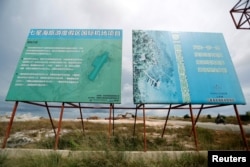Prime Minister Hun Sen on Monday denied reports that a Chinese-built port in Koh Kong province could be used to dock China Navy vessels.
A report published by online newspaper Asia Times last week quoted analysts as saying that the deep-water port being built by the Union Development Group (UDG) was large enough to host frigates and destroyers.
Cambodia’s constitution prohibits the government from allowing foreign powers to build military bases in Cambodian territory.
Speaking during a cabinet meeting in Phnom Penh, Hun Sen said Cambodia “doesn’t allow foreign military bases regardless of whether its for naval forces, infantry forces, or air forces.”
“We denied all the information that was fabricated as the truth. We want to officially clarify today and I will write a letter to Vice President Mike Pence informing him about the issue,” he added.
Pence was expected to raise the issue with Hun Sen during a meeting of world leaders in Singapore this week.
Hun Sen went on to say that he would not allow Cambodia to become a “stage for conflict” or for “testing ideologies or arms”.
A US Embassy spokesman did not respond to a request for comment on Monday.
Last week, Prak Sokhon, foreign minister, also “categorically dismissed” the rumor.
The Asia Times article suggested that if the port became a de facto Chinese naval base it would place Cambodia firmly within Beijing’s strategic camp amid heightening US-China tensions.
China holds nearly half of Cambodia's $6 billion in foreign debt, and it is Cambodia's biggest trading partner. Chinese investment is transforming Cambodia's real estate market and gaming industry, particularly in Sihanoukville, a special economic zone.
Much of this has been driven by China's Belt and Road Initiative (BRI), which will build $1 trillion in roads, bridges, railways, ports and power plants in more than 70 countries to steer global commerce its way.
Billed as China's win-win drive for creating economic opportunity in Asia and the Indo-Pacific, the infrastructure investments, such as deep-water ports, are being met with increasing skepticism.
China's maritime BRI projects, the so-called "String of Pearls" in coastal states of the Indo-Pacific, have long been seen by many analysts as a move "to create de facto overseas military bases for China's military forces," according to a recent report by C4ADS, an NGO.
While studies have found these "ports lack the infrastructure necessary to support a conventional war," the report said, "this finding does not rule out fears that China is attempting to use its commercial ports as logistical support points for long-range naval patrols defending its interests abroad."









